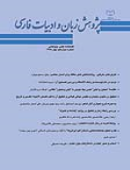آموزش فعل مركب فارسي به غیرفارسی زبانان
محورهای موضوعی : پژوهشهای ادبیات کلاسیک ایرانزينب محمد ابراهيمي 1 * , حسن شاهیپور 2
1 -
2 -
کلید واژه: فعل مرکب نظريه حاکميت و مرجعگزيني ساخت موضوعی زبان فارسي گفتاري معيار راهکار آموزشي,
چکیده مقاله :
مقوله فعل مركب از جالبترين، ظريفترين و در عين حال پيچيدهترين بخشهاي پژوهشهاي نحوي است كه توجه بسياري از زبانشناسان و مدرسان آموزش زبان دوم /خارجی را به خود معطوف كرده است. اين پژوهش سعی دارد با استفاده ازتحليل ساختار فعل مرکب فارسي گفتاري معيار در چارچوب نظریة حاکمیت و مرجعگزینی و نیز با استفاده از شيوههاي نوين و علميآموزش زبان و واژه، راهکار علمي و کارآمدی جهت آموزش فعل مرکب فارسي به غيرفارسيزبانان به دست دهد. بر طبق این پژوهش، فعلهاي مركب فارسي گفتاري معيار را میتوان به لحاظ تعداد موضوعهاي آن به دو دسته يك موضوعي و چند موضوعي تقسيم كرد. براي آموزش فعل مرکب به غير فارسي زبانان، بهتر است در سطح مبتدي از فعلهاي مرکب يک موضوعي و در سطوح بالاتر از فعلهاي مرکب با موضوعهاي بيشتر استفاده کرد. بعلاوه استفاده از متنهاي گفتاري که بهصورت طبيعي و به منظور ايجاد ارتباط تهيه شدهاند مناسبتر به نظرمیرسد.
The category of compound verbs is one of the most interesting, subtle and yet complex part of syntactic researches that has attracted the attentions of many linguists and teachers teaching a second/ foreign language. Analyzing the structure of compound verbs in spoken standard Farsi language in terms of Government and binding theory, and using a new scientific method of teaching language and vocabulary, the present research tries to provide a new practical and effective way of teaching Farsi compound verbs to the speakers of languages other than Farsi. According to the finding of the research, the compound verbs can be divided into two groups: one-argument verbs and multi-argument verbs. At elementary levels, it is better to start teaching with the first group. The second group should be taught at higher levels. Moreover, it seems appropriate to use spoken materials that have already been recorded in real communication contexts.

